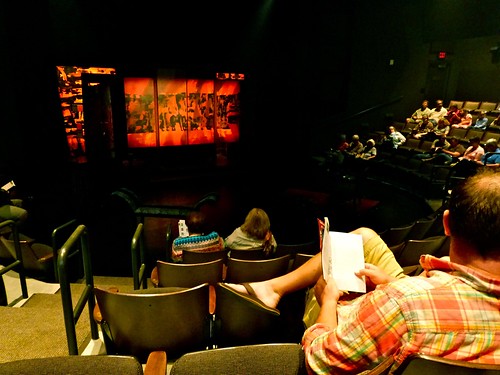I'm making an ongoing project out of collecting questions about what people think is the right image for a law professor. It's not that I'm aspiring to fit this image or trying to convince anyone else to, but mostly that I'm interested in how people think a law professor — and maybe, more generally, a teacher — ought to dress and act and so forth. This project got started yesterday when I asked a colleague whether a law professor can wear sandals in class.
No, she said instantly and emphatically. Not even really nice sandals — expensive, beautiful sandals with low heels?
No. Even if you have a excellent pedicure?
No.Why? Is there something about seeing my toes that makes it hard to get your mind around minimum scrutiny? Is there something about the absence of hosiery that makes you worry that I've skimped on preparation? I understand the value of professional appearance and demeanor. The issue here is not whether you should do all you can to tap that value. I'm interested in the specific elements of professional appearance and demeanor in the law school classroom. You're teaching people to be lawyers, but you aren't in a courtroom or law office. Should you nevertheless model the look and tone appropriate to the setting your students will enter? Or is a classroom a much more casual place, where you can — and should — not only adopt a different look, you can speak and act in a different way.
You understand my project. Let me begin my list of questionable things for a law professor:
1. Sandals. Consider the variations. Would you say yes to dressy sandals on a woman but no to Birkenstocks on a man and flip-flops on anyone? Does your rule vary depending on whether there's a fresh pedicure? Does hairiness or gnarliness change the rule?
2. Other footwear. Can a lawprof wear sneakers? Fluffy slippers? (I once saw a pro se plaintiff in federal court try a case wearing fluffy slippers!) Mary janes? Mary janes with oddly colored socks (fuschia, chartreuse, etc.)? Are bare feet ever allowed — perhaps in a small class in the summer session? Don't we all know of at least one lawprof who taught barefoot? Actually, I often walk around the hallways around my office in bare feet or purple socks, but I think I've always kept shoes on in class.
3. Exposed limbs. If we're not wearing jackets, should we at least have long sleeves? Are women but not men allowed to reveal their arms? As for legs, surely it is unacceptable to wear shorts. On the other hand — hand? — skirts for women are obviously dressier than pants. There can't be some emerging rule — I'm looking at Hillary Clinton — that a woman
must wear pants to look professional, but there might be some ideas about whether the legs exposed by a skirt can be bare and how short a skirt can be. And what about a really long skirt? I've often found it comfortable and amusing to wear a below-calf length skirt.
4. Bralessness. I've always assumed the rule here is that you can go braless in class if no one can tell. There are many other breast-related questions, but perhaps you would think it unprofessional of me to ask them. These questions would have to do with the tightness and low cut of upper body clothing and the visibility of nipples and so forth. (Seriously, if you want students to know that you're really excited about the rule against perpetuities or some such thing, you want them to get the message from your face, your tone of voice, and your flailing hands.)
5. Slang. I've always assumed it's not just acceptable but highly desirable to speak in a casual, conversational way in class, but where is the line? Let's say you are examining a foolish Supreme Court decision in a conlaw class. Which if any of these phrases should be avoided: a. What the heck did Rehnquist mean by that? b. What the hell is that that supposed to mean? c. Did the Court screw up? d. What the fuck?
6. Getting into strange positions. I think a good professor ought to move around a bit. It's especially good to get away from the lectern and write on the blackboard — to relieve tedium if nothing else. But should the lawprof remain on the podium — in the teacher's space — or is it okay or even good to walk out into the classroom and maybe lean against the wall over there? Is it wrong — or perhaps good — to sit on the table or ledge in the front of the classroom? Some lawprofs will sit in a strange way. I remember my Conflict of Laws professor sitting sideways on a narrow ledge with his hands coyly clasped around his one upraised knee. I remember this
30 years later! Yet I myself have often sat on the desk in a cross-legged position (with both feet up).
7. Stalling. Do the first few seconds of class not count, so that you can toss off a few lines about something that was just on TV or in the news? Examples: a.
How could Archuleta think he could do a Stevie Wonder imitation on Beatles night? b.
Exactly why is prostitution illegal? But we can't talk about prostitution. We're here to talk about the independent and adequate state ground doctrine. I tend to think motive matters. If you're off-topic and casual to begin because you're trying to create a good mood and get everyone to settle in and start paying attention, it's good. But if you're stealing time from students to impose your political views, it's bad. But that part isn't about one's professional image, is it?
8. Digressing. Once class has started, when is digressing acceptable? I'd say the shorter the digression, the less justification it needs. There are funny, pointless things you can say that take two seconds, and there are anecdotes that consume whole minutes. And content matters. There are those tales of the days when you were a lawyer, which may seem professional but are really the most outrageous waste of time. And then there are the wordplay and little cultural references that leaven speech. I like a lot of that, but I realize it may be distracting or annoying. And then there are some students who are so earnest and diligent that they take everything seriously and could mistake your little joke as part of the doctrine. If you have a dry, deadpan, or subtle sense of humor, your students may simply perceive you as bizarre and unreliable.
I'll stop now, but you get the point. To be continued. I haven't mentioned
blogging yet, but obviously, there are some big questions there.








